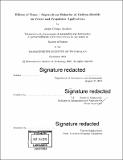Effects of trans / supercritical behavior of carbon dioxide on power and propulsion applications
Author(s)
Crespo Anadón, Javier
DownloadFull printable version (12.99Mb)
Other Contributors
Massachusetts Institute of Technology. Department of Aeronautics and Astronautics.
Advisor
Zoltán S. Spakovszky.
Terms of use
Metadata
Show full item recordAbstract
Operating combustors at supercritical conditions has the potential of reducing NOx emissions and enabling a more compact combustor design. However, this can have an impact on the combustion dynamics, and the impact of trans-critical conditions is unknown. A reduced order model framework was developed to assess the impact of droplet evaporation time on the combustion dynamics under sub-, trans- and supercritical conditions. This framework combines an analytical one-dimensional acoustic solver with a previously developed droplet evaporation model and a heat release oscillation model based on the droplet evaporation time. This approach yields low computational cost and is useful for the identification of trends in combustion dynamics and complementing high fidelity calculations. The results were validated with analytical predictions and unsteady three-dimensional CFD calculations. The results suggest that droplets with longer evaporation times have a stabilizing effect on the combustor dynamics. The second part of the thesis investigates the condensation behavior for metastable carbon dioxide (CO₂). Using a previously established blowdown experiment with optical measurement capability, the current state-of-the-art equation of state was verified in the metastable region and demonstrated to be within 4% of the measurements. Additional Wilson line measurements were obtained near the critical point and the measurement procedure was validated using a nozzle geometry from the literature. Lastly, an attempt was made to characterize the effect of expansion rate on condensation in non-dimensional terms. A reduced frequency like parameter was introduced comparing the expansion rate with two other relevant time scales. Neither the fluid residence time nor the acoustic time based on upstream stagnation conditions collapsed the data adequately, rendering the analysis inconclusive.
Description
Thesis: S.M., Massachusetts Institute of Technology, Department of Aeronautics and Astronautics, 2018. Cataloged from PDF version of thesis. "Pages with color images contain background shading/streaking"--Disclaimer Notice page. Includes bibliographical references (pages 85-88).
Date issued
2018Department
Massachusetts Institute of Technology. Department of Aeronautics and AstronauticsPublisher
Massachusetts Institute of Technology
Keywords
Aeronautics and Astronautics.